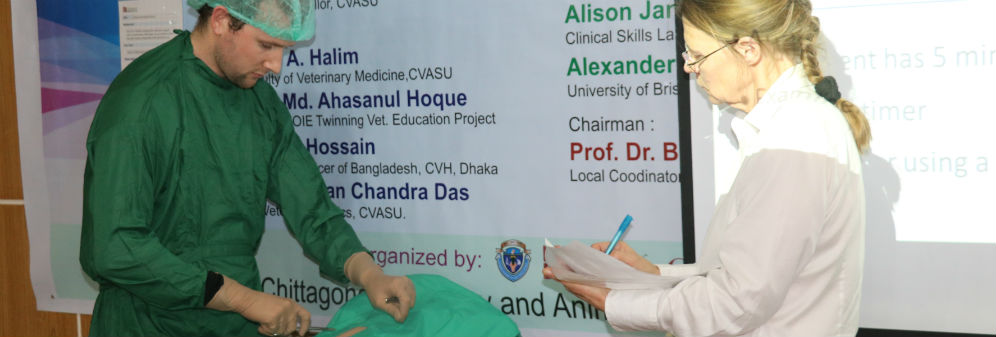Improving veterinary prospects with a global approach to professional development

Hundreds of trainees and practicing vets are benefiting from initiatives undertaken by Bristol Vet School’s clinical skills team, including workshops delivered around the world, innovative approaches to developing animal models and open access knowledge systems.
Professor Sarah Baillie founded the Clinical Skills Lab at Bristol Vet School and runs an online network for clinical skills teachers around the world. She and the Vet School’s Clinical Skills Lab team are also responsible for creating an equally popular set of animal models that allow students to safely practise their skills and learn from their mistakes – in a realistic setting with no risks.
Underpinning these initiatives is the fundamental principle of community practice – the models and the network emerged, and continue to evolve, based on the needs and resources available to users and sharing within the community.
“There is so much you can learn if you take the time to listen to other people and watch them at work,” says Professor Baillie, whose academic and professional credentials, built up over a career spanning more than 30 years, has seen her invited to deliver plenaries and lead workshops everywhere from Bangladesh to Australia.
“I practised as a vet for 20 years before I started to teach and provide training. Helping people to work more effectively and efficiently is one of the most enjoyable and satisfying things you can do.”
Community practice
Professor Baillie and colleagues recently returned from a two-day workshop in Chittagong, Bangladesh, where they were invited to help 40 delegates representing the vet schools from Bangladesh and Sri Lanka to establish a series of new clinical skills laboratories.
One of the key aspects of the workshop involved adapting the Vet School’s animal models – which are either of the whole animal or the relevant part – for use in the veterinary training sessions. Creating the models in such a way that the materials and the component parts can be sourced locally and working with the delegates to develop a plan for their school’s skills lab were the main priorities.
It’s this sensitivity to each group of trainees’ needs and capabilities that drives Professor Baillie’s work ethos, to which she has remained committed in semi-retirement.
“Our goal is to share knowledge and apply what we learn in a way that can be of assistance within the context that people are working,” explains Professor Baillie, who earned her undergraduate veterinary degree from Bristol in 1986. She undertook her PhD in computer science at Glasgow in 2006 and developed the Haptic Cow, a virtual reality computer simulator for teaching students to diagnose bovine pregnancies She won the inaugural Times Higher Education Most Innovative Teacher of the Year for her work with haptic simulators and she and the Haptic Cow featured on the Royal Institution’s Christmas Lectures in 2014..
After a period in practice and retraining in computer science and education, she returned to Bristol in 2012 as a Professor of Veterinary Education and while she officially retired in 2017, her global credentials coupled with her enthusiasm for the role has meant she has continued to play an influential role as an Emeritus Professor.
“I find it fascinating to learn from other people, and to learn how other people learn,” she adds. “Using the animal models that we’ve created allows trainees to practise in a way that they feel supported and calm and mistakes do not have serious consequences.
“It makes an immeasurable difference to be able to focus purely on what you’re doing so that when you do go out to practice or teach, you can do so with a solid foundation.”
Open access learning
The workbooks associated with the models and skills used for teaching students and during the training workshops are available to veterinary practitioners via the Vet School website as a free resource under a creative commons licence.
More than 100 people visit the downloads section of the website every week to access these tools. Through the work of Professor Baillie and the clinical skills lab team in Bangladesh, Morocco, America, Dublin, Germany, Australia and elsewhere – and the online forum people have forged new connections which continue to grow.
The result: a growing globally connected community of veterinary clinical skills teaching enthusiasts who share common ground despite the geographical distance between them.
Professor Baillie notes: “There’s no doubt that through the connections we share around the world, some made virtually and many face-to-face at workshops and conferences, the veterinary clinical skills community continues to grow and empower people as teachers in many countries, so we can help our students better prepare for their working careers.”